News & Events | About PKU News | Contact | Site Search A special edition of PKU News in commemorating the 113th anniversary of Peking University.
Peking University, Apr. 28, 2011: A university anthem, representing the unique style and spirit of a university, glues students' hearts while serves as part of its outreach.
The opinion on the vacancy of Peking University’s official anthem varies. Some view it as a regret; while Professor Zhou Qifeng, President of Peking University, said that the absence of officially recognized motto and anthem at PKU showed her "freedom of spirit," according to a recent interview.
However, as the first national comprehensive university in modern China, PKU has indeed been sung with a number of songs accross the past century.
Rise of anthem
The university's earliest anthem dates back to 1917. On December 17, the anniversary song (below) was performed for the first time upon the 20th anniversary of PKU (according to traditional Chinese count; also the first recorded anniversary celebration since 1898). It was during the term of President Cai Yuanpei who reformed the university with determination. He led to set up a dense academic atmosphere and changed students' previous view regarding PKU as a "status ladder."
The song was praised for its elegancy and delicacy, like ancient lyrics, with graceful, bold characters.
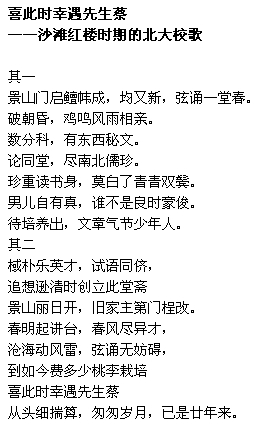
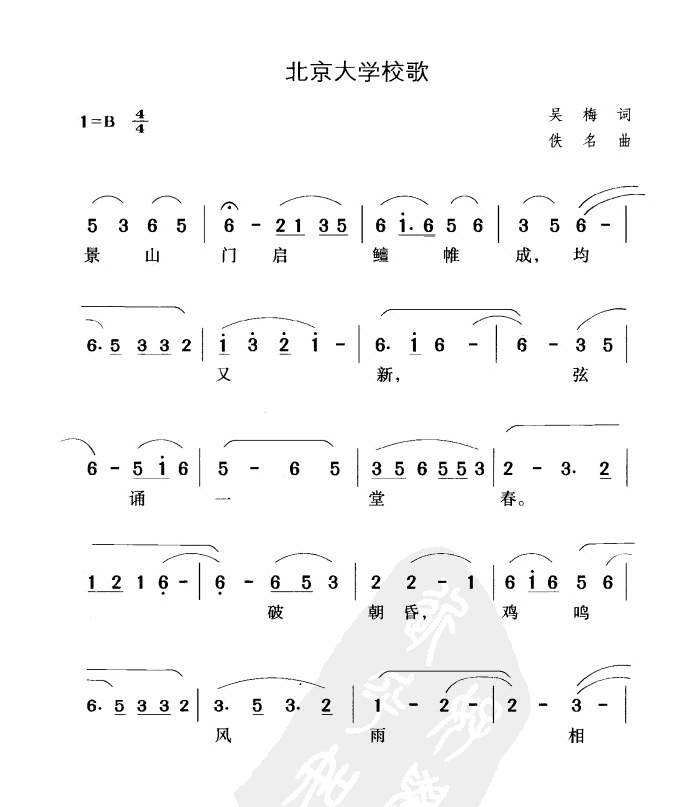
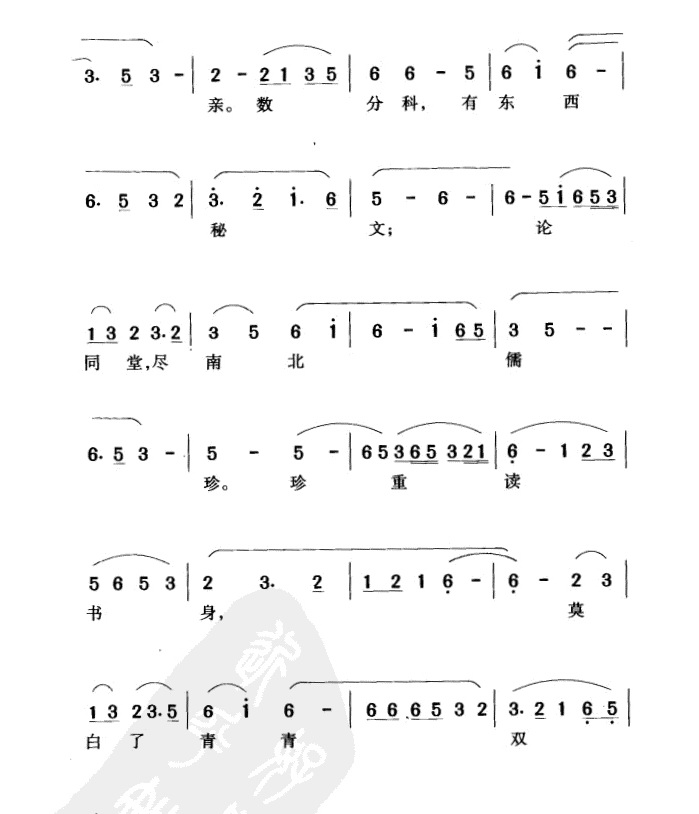

PKU Anthem (composed in 1916) (Source: "Brochure for the 20th anniversary celebration of the National University of Peking," via Duxiu)
Its composer Wu Mei, a drama theorist, educator, poet, and lyrics writer, was a PKU professor of humanities at that time.

Wu Mei (File photo)
Though far more popular, the song was perhaps not accepted by President Cai, because of containing admiring lyrics for Cai himself. In November 1921, the university issued a president's announcement saying that the 20th anniversary song could not serve as the official anthem. Since then, no anthem agenda had been brought up until the War of Resistance against Japanese Aggression (1937-45).
The National Southwest Associated University anthem

The National Southwest Associated University (File photo)
Behind the anthem of the National Southwest Associated University (below) was renowned Chinese philosopher Feng Youlan. "As the lyrics of the university anthem, my composition also reflected the meaning of "zhenxia qiyuan," or a philosophical repeating in endless cycles," Feng once wrote. However, others claimed that the lyric was written by Luo Yong, professor with the Department of Chinese.

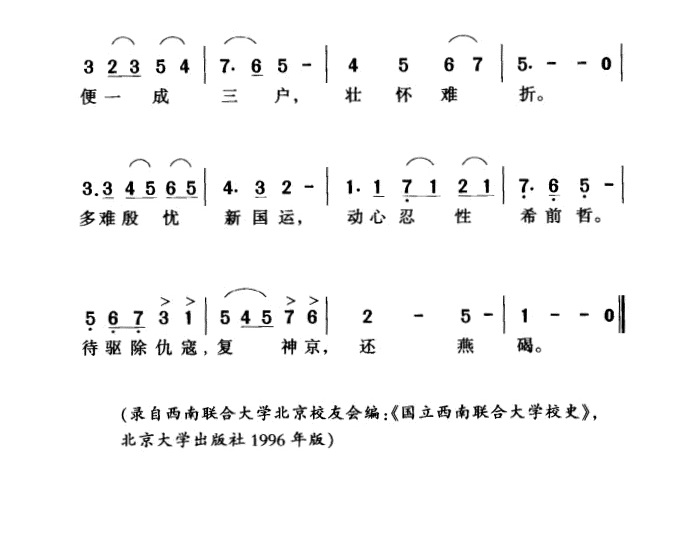
According to the China Culture News, there was an unadopted lyric written by Feng for another anthem.
In order to clarify the case, reporters from the PKU Journalism and Communication Press (JCP) interviewed Feng's daughter, renowned writer Zongpu in 2008. Zongpu did not provide more information. But she said a university anthem played an important role in the campus culture. She thought it necessary to set an official anthem in order to convey the PKU spirit. As the historical dispute remained unsolved, the lyric's spirit has been ever-lasting.
As Tianjin and Beiping fell into enemy's hands during the war, PKU, Tsinghua, and Nankai universities moved southwestward and in the spring of 1938, the three initiated a new university - the National Southwest Associated University. Warring years did not impede the development of the associated university; on the contrary, it was later regarded among "China's best universities in history." The anthem included both the tradition and spirit of the three universities, and the Chinese people's patriotism - as the lyric followed Yue Fei's “Manjianghong,” a noted Chinese poem resolved to fight against invasion and recover the lost land.
Yenching anthem
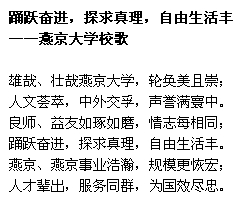
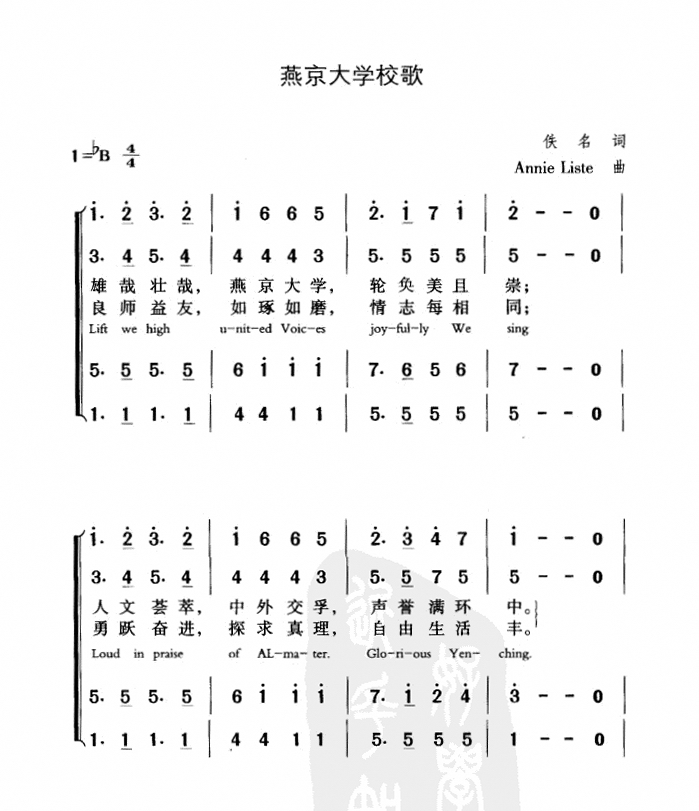
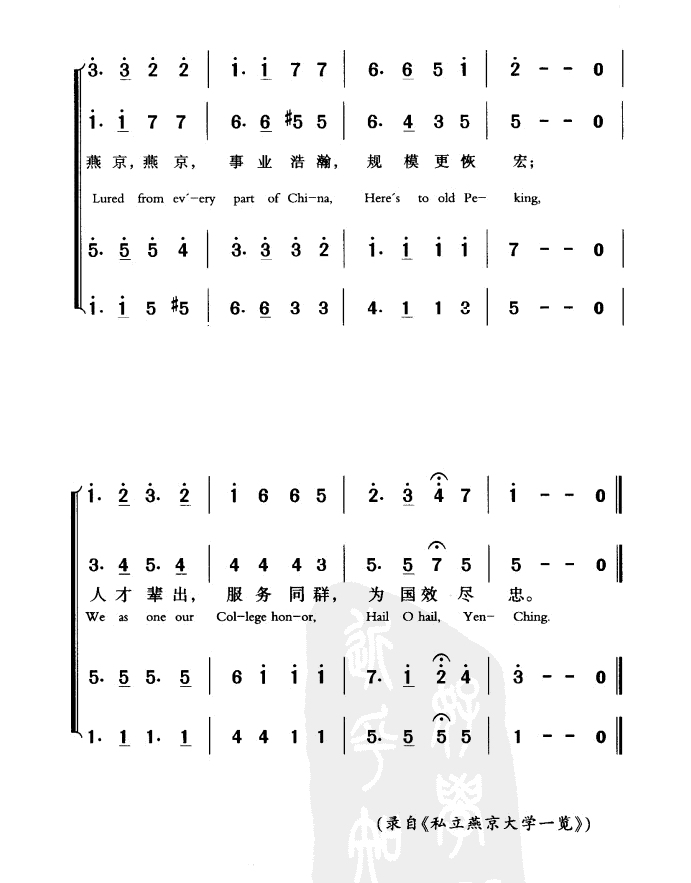
Yenching Anthem (via Duxiu)
The lyric's English version read:
Lift us high united voices - joyfully we sing - loud in praise of Alma Mater - Glorious Yenching
Lured from every part of China - here's to old Peking - We as one college honor - Hail O Hail, Yenching!
Yenching University was the best-known Christian college in China, making significant contributions to the nation's progress in modern times. With contributions from American publisher Henry Luce and Alcoa founder Charles Martin Hall, Yenching bought a former imperial park in western Beijing. With architect Henry K. Murphy's overall planning, these parks became modern China's most beautiful campus, which was now Yan Yuan.
The Yenching motto was "Freedom through Truth for Service," or "Yin zhenli, de ziyou, yi fuwu."
Yenching was merged into PKU in 1952 during a nationwide restructuring of colleges and departments.
PKU "anthem" today
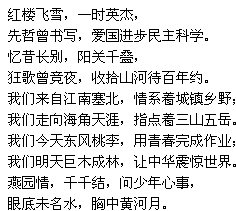
Yanyuanqing at 20th anniversary celebration of PKU Student Choir (PKUSC) (Courtesy of PKUSC)
The song was written by Meng Weidong, a renowned contemporary Chinese composer. Yanyuanqing (Yan Yuan love), created in 1998 upon the centennial celebration of the university, was initially known as "Jingshen de jiayuan" (Home of spirit).
The current title refers to a new PKU that has been situated in Yan Yuan - or the former Yenching campus - since 1952. The lyric, written by Zhou Baoping, reviews the history from the May Fourth Movement through the National Southwest Associated University period onward, while expressing the current students` dedication to the motherland with a universal vision.
"Through this piece, I intend to highlight both the classical and contemporary, exemplifying that Peking University has not only the past, present but also the future," said Meng Weidong as was recalled by a former PKUSC member.
Though not officially identified, Yanyuanqing has been regarded as a substitutive anthem since the 1998 centennial celebration.
Extended Reading:
Audio: Yanyuanqing (1998 premiere; lead vocalists: Song Xianhua and Zhang Pei)
【Anniversary Special】PKU Anniversary Day: Questions and the answer
【Anniversary Special】W. A. P. Martin: Inaugural president of the Imperial University of Peking
【Anniversary Special】How to "identify" PKU
【Anniversary Special】"In the beginning was the word"
Written by: Wang Jingran
Edited by: Arthars
Source: JCP (News), ce.cn, and PKU News (Chinese)